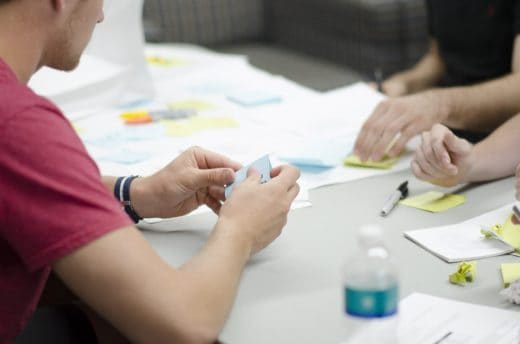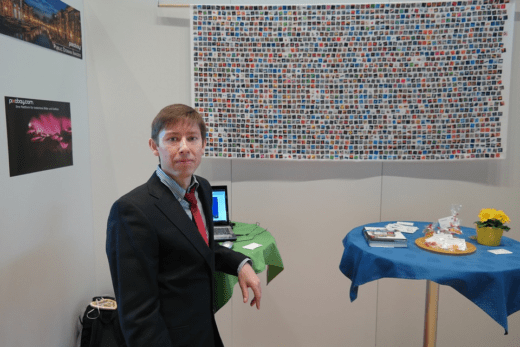
Many nonprofits are pioneering fundraising and JDRF is a great example.
This story is from one of our many clients who heightened organization, training and communication efforts around their auction—creating a better donor experience.
First events are always tough, and Development Coordinator Laura Eberly’s first event with the Lincoln and Greater Nebraska chapter of JDRF was no exception.
It was 2013, and I was there to assist them as a Professional Event Services consultant. Everyone learned a lot that night— I didn’t see how much until I returned to the event in 2014. Laura had asked a lot of questions after her first event. This year she had made big changes to her process.
Then she did it again, in 2015… And again in 2016.
Laura Eberly and Executive Director Jayne Ullstrom strive constantly for excellence— and to create an event experience that will bring guests back year after year. They were gracious enough to share some of the valuable lessons they’ve learned over the last four years.
Put the Focus on Enjoyment
Early on, Laura and Jayne figured out that the best way to make more money at an auction was to ensure that guests had a good time. It sounds simple, but it’s something that often takes a while to click with event directors: that happy people who are enjoying themselves spend more money at fundraisers.
After a tough registration and check-out their first year on the job, Laura and Jayne were more determined than ever to curate an event experience that would bring people back— and have them telling their friends about what a great time they had.
Data, Data, Data
 After the first year, the auction team realized that data is everything. Every ticket in the Greater Giving software that didn’t have a complete name, an allocated seat, or a phone number was a liability at registration— especially once the chapter added mobile bidding. Most mobile bidding services rely on phone numbers in order to send guests pre-event text messages, and to set up their devices for bidding.
After the first year, the auction team realized that data is everything. Every ticket in the Greater Giving software that didn’t have a complete name, an allocated seat, or a phone number was a liability at registration— especially once the chapter added mobile bidding. Most mobile bidding services rely on phone numbers in order to send guests pre-event text messages, and to set up their devices for bidding.After four years working with the Lincoln and Greater Nebraska chapter, I’ve discovered that Laura is wonderfully strict about getting data into the system. As a result, her database is always flawless by the time I show up on event morning.
“I maybe end up with fifteen or twenty people out of 400 who I don’t have information for,” Laura said. She’ll call sponsors over and over until she gets all their guest names and phone numbers. She’s stopped being afraid of calling, because she knows it’s better for everyone. “I just want to make your night better,” she tells them each time she calls— and it’s true. As a result of their persistence, event registration has become more organized, smoother, and easier for everyone. Every guest who shows up is on the guest list, so they feel welcome and appreciated.
Laura happily calls herself a control freak, because of how much she values the integrity of her Greater Giving data. “Control freaks make the world go ‘round,” she said with a laugh.
And Control Freaks Rule Check-out
After their first year, when massive disorganization at item pickup led to long wait times, Laura realized she had to take a strong leadership role in check-out if she wanted it to be done right.
The item pickup volunteers needed to be self-sufficient while Laura and Jayne were doing other things, so she provided them with organization and direction. First, she gave the item pickup team lists of all packages in the auction and what was included in them: a certificate, an item, maybe both.
Then, on the morning of the event, they had all the check-out volunteers come in early to orient themselves with the items and packages in the auction, so they’d be familiar with them. Then Laura provided the volunteer group with clearly marked boxes for the package descriptions, so it would all be in one place when they started moving items from the silent auction room to item pickup.
It was little things that made a big difference. “I triple check all item certificates, then I put them in identical 8.5-by-11-inch envelopes, so none of them get lost.” No more irregularly-sized envelopes that are too short to find! To make things as clear as possible for volunteers, she labeled each item certificate with its item and package numbers, then stored them in one place so everyone would know where to look.
And receipts, which are notorious for floating around and getting lost? “We put them all in binders by bid number,” explained Laura. “Someone just gives us their bid number, and we have their receipt and bagged items ready to go.” Then a volunteer checks each bag going out to make sure all the items are there, the guest signs to confirm receipt, and they go home.
Getting the Word Out
Laura learned after her first year with mobile bidding that having a prepared audience is key. The chapter now sends out “reservation confirmations” the week before each event, outlining how guests can register their credit cards in advance and how to submit their personal information so the chapter can collect as much as possible before the event. This process helps to make registration smoother and cut down on lines.
The confirmation mailing also includes a schedule of events, dress code, and tips about bringing a charged smartphone.
“I try to let all the guests know what’s going on in advance.” she said. People who have attended the event before get it, and the new guests invited to join a table don’t have to wait in long lines to get registered.
The Great Cocktail Table Experiment
 With the number of event attendees growing every year and the event space staying the same size, the auction team is always thinking about ways to provide the best guest experience within their limits. When Greater Giving made mobile card readers available in time for their most recent gala, Laura saw an incredible opportunity.
With the number of event attendees growing every year and the event space staying the same size, the auction team is always thinking about ways to provide the best guest experience within their limits. When Greater Giving made mobile card readers available in time for their most recent gala, Laura saw an incredible opportunity.
“I’m a big advocate of cocktail tables,” explained Laura. “It’s so much easier to have a normal conversation with someone face-to-face, instead of the guest bending down and the volunteer looking up at them. That’s awkward.”
The cocktail tables totally shifted the atmosphere of the event. Volunteer and guest both now stood at eye level, and the dynamic went from formal to casual. Laura made sure hotel staff were available to serve beer and wine, so guests could drink and socialize while waiting to check in. With this shift, registration instantly became a warm introduction to the event experience.
And with the cocktail table arrangement, there were no more lines— volunteers simply directed guests who arrived to an open table. It no longer looked busy or congested. “It’s a welcoming atmosphere, like a cocktail hour, instead of registration.”
This year, Laura got fantastic feedback from the audience. “I’ve had so many compliments on how things went— definitely the most organized gala we’ve ever had!”
The Right Volunteers, Year After Year
“A big part of our success was our volunteers,” Laura said. She’s had the same ones every year she’s been in charge of this event, mostly college friends. “They’re financial people— very analytical. They get things done.” And she’s right: they’re detail oriented and able to handle a small fire if it comes up.
Most importantly, they know their way around a computer— a key trait to look for in someone responsible for checking in guests or helping with data entry.
I asked Laura how she keeps these fantastic volunteers coming back each year. “I listen to them,” was the simple answer. “I want to please them and make it easier for them, because they’re helping us out. So if they come to me with an idea, I’ll consider making a change.” A lot of ideas for improvement have come from volunteers.
Laura also does personalized volunteer thank yous, to show them how much their work means. She finds small gifts, or makes her own, for volunteers who stay all day. For everyone else, she writes a four- or five-sentence personalized thank you about what that volunteer did, and how it made an impact.
“It goes a long way— you don’t have to spend a lot of money to say thank you if it’s heartfelt.” That attention to detail and deep connection to their community is what makes JDRF of Lincoln and Greater Nebraska such a fundraising success story.
To find out how good data can help you sell auction items for a much higher value, read the client story .
